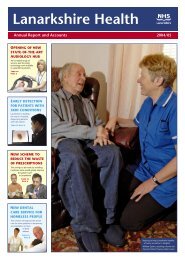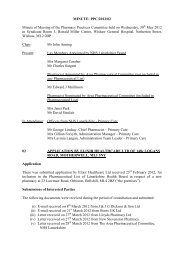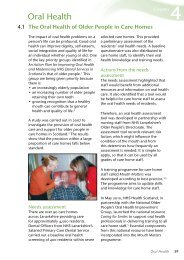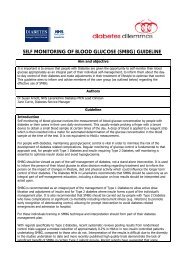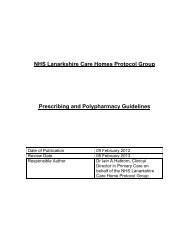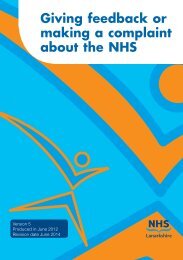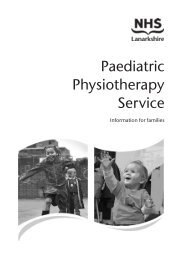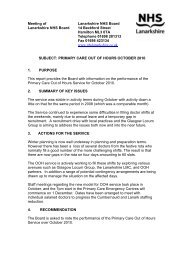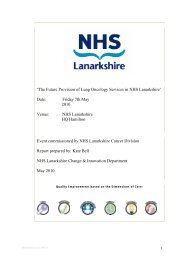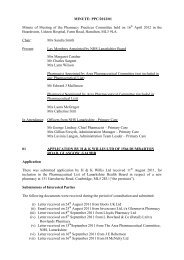Palliative Care Guidelines - NHS Lanarkshire
Palliative Care Guidelines - NHS Lanarkshire
Palliative Care Guidelines - NHS Lanarkshire
- No tags were found...
Create successful ePaper yourself
Turn your PDF publications into a flip-book with our unique Google optimized e-Paper software.
<strong>Palliative</strong> <strong>Care</strong> <strong>Guidelines</strong>: ItchItch in <strong>Palliative</strong> <strong>Care</strong>IntroductionItch may be localised or due to systemic disease. It can cause discomfort, frustration, poor sleep,anxiety and depression. Persistent scratching leads to skin damage – excoriation and thickening.Patients with itch usually have dry skin.Assessment• Examine the skin; look for local and systemic causes. May be multifactorial.• Primary skin disease (eg. atopic dermatitis, contact dermatitis, psoriasis).• Infection – candidiasis, lice, scabies, fungal infection.• Medication – opioids (particularly morphine, diamorphine).• Systemic diseases that can cause itch include:Cholestatic jaundiceHepatitisHepatomaPrimary biliary cirrhosisParaneoplastic syndromeManagementChronic kidney diseaseThyroid diseaseDiabetesIron deficiency +/- anaemiaLymphomaLeukaemiaMultiple myelomaPolycythaemiaMycosis fungoides• Treat underlying cause(s). Review medication to exclude a drug reaction.• Use an emollient or aqueous cream frequently as a moisturiser.• Add an emollient to bath water and use aqueous cream as a soap substitute.Topical Agents• Emollients• Aqueous cream (1% menthol can be added).• Crotamiton 10% cream (Eurax) or capsaicin (0.025%) cream for localised itch.• Topical corticosteroid (mild/moderate potency) once daily for 2-3 days if the area is inflamedbut not infected.Medication• Antihistamine (stop if no benefit after a few days).• Sedating antihistamine if poor sleep is a problem (eg. chlorphenamine, hydroxyzine).• Some non-sedating antihistamines can have an antipruritic effect (eg loratadine, cetirizine).• An antidepressant can help if the patient has associated anxiety or depression.• Cimetidine 400mg twice daily for itch in lymphoma or polycythaemia.(Check BNF for drug interactions).• Biliary stenting: may relieve the symptoms of cholestatic jaundice.Practice points• Avoid topical antihistamines as they can cause allergic contact dermatitis.• Systemic treatment is often unnecessary if skin care is improved.Patient advice points• Keep nails short and clean. Wear loose clothing, preferably cotton. Keep cool.• Dry skin by gently patting rather than rubbing; then apply moisturisers.• Avoid lanolin and perfumed products; try a little baking soda in the bath water.Further reading: http://www.palliativecareguidelines.scot.nhs.uk© <strong>NHS</strong> Lothian Issue date: January 2009 Review date: March 20121



